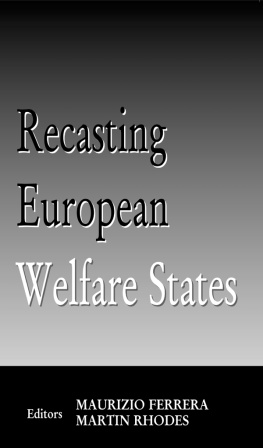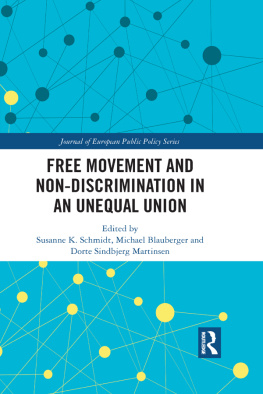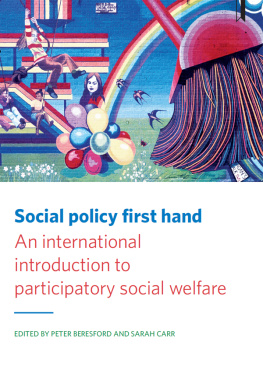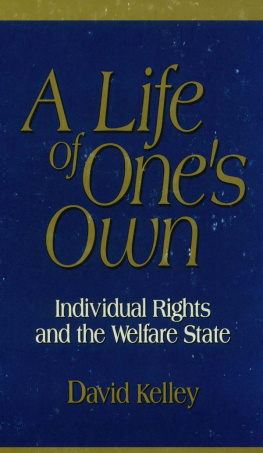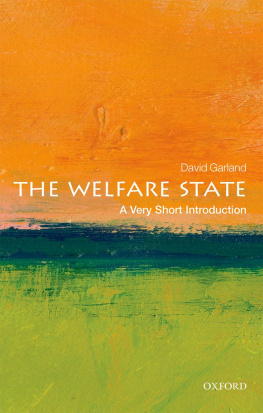BOOKS OF RELATED INTEREST
The Changing French Political System
edited by Robert Elgie
Compounded Representation in West European Federations
edited by Joanne B. Brzinski, Thomas D. Lancaster and Christian Tuschhoff
Politics and Policy in Democratic Spain: No Longer Different?
edited by Paul Heywood
Britain in the Nineties: The Politics of Paradox
edited by Hugh Berrington
Crisis and Transition in Italian Politics
edited by Martin Bull and Martin Rhodes
Southern European Welfare States: Between Crisis and Reform
edited by Martin Rhodes
The Euro-Mediterranean Partnership: Political and Economic
Perspectives
edited by Richard Gillespie
The State in Western Europe: Retreat or Redefinition?
edited by Wolfgang C. Mller and Vincent Wright
The Regions and the European Community
edited by Robert Leonardi
The Regional Dimension of the European Union
edited by Charlie Jeffery
National Parliaments and the European Union
edited by Philip Norton (new in paperback)
The Crisis of Representation in Europe
edited by Jack Hayward
The Politics of Immigration in Western Europe
edited by Martin Baldwin-Edwards and Martin A. Schain

First Published in 2000 in Great Britain by
FRANK CASS PUBLISHERS
Crown House, 47 Chase Side,
Southgate, London N14 5BP
and in the United States of America by
FRANK CASS PUBLISHERS
c/o ISBS, 5824 N.E. Hassalo Street
Portland, Oregon, 97213-3644
Website: www.frankcass.com
Copyright 2000 Frank Cass Publishers
Reprinted 2002
British Library Cataloguing in Publication Data
Recasting European welfare states
1. Welfare state 2. Public welfare Europe 3. Europe Social policy
I. Ferrera, Maurizio II. Rhodes, Martin, 1956 Feb. 23
361.65094
ISBN 07146 5103 6 (hb)
ISBN 07146 8143 1 (pb)
ISBN 978-1-1353-0933-6 (ePub)
Library of Congress Cataloging-in-Publication Data
Recasting European welfare states / Maurizio Ferrera, Martin Rhodes.
p. cm.
Includes index.
ISBN 0-7146-5103-6 ISBN 0-7146-8143-1 (pbk.)
1. Europe Social policy. 2. Welfare state.
I. Ferrera, Maurizio. II. Rhodes, Martin.
HN373.5 .R43 2000
361.65094 - dc21
00-029044
This group of studies first appeared in a Special Issue of West European Politics
(ISSN 0140-2382) Vol.23, No.2 [Recasting European Welfare States]
All rights reserved. No part of this publication may be reproduced, stored in or introduced into a retrieval system, or transmitted, in any form, or by any means, electronic, mechanical, photocopying, recording, or otherwise, without the prior written permission of the publisher of this book.
Printed in Great Britain by Antony Rowe Ltd, Eastbourne
MAURIZIO FERRERA AND MARTIN RHODES
Since the establishment of compulsory social insurance in Wilhelmine Germany back in 1883, the welfare state has made a fundamental contribution to the modernisation of European society: its programmes have greatly contributed to consolidating democratic institutions and to harmonising economic growth with changing social needs. Yet, despite its unquestionable historical success, the welfare state is entering in its second century of life in conditions of strain and uncertainty. A child of the nation state and industrial society, it stands somewhat disoriented amidst the new socio-economic and political context, characterised by the rapid transition to post-industrialism, increasing globalisation, sweeping changes in demography and social relations, trends towards supranational integration and a new, post-cold war politics. No institution can survive without adapting: thus the European welfare state is now faced with a difficult challenge of internal restructuring, involving a recasting of many of its traditional instruments and objectives.
But what exactly is the nature of this challenge? What specific features of social protection European style are most in need of adaptation? How advanced is the restructuring process in the various countries, in terms of actual reforms? And what social and political factors can facilitate this process? These are the main questions addressed by the chapters contained in this volume. By way of introduction, we will briefly articulate these broad questions and present some of the specific themes discussed by the various authors.
In public debates on both sides of the Atlantic, the European model of the welfare state based on universal coverage and generous levels of protection is frequently accused of being unsustainable, not only with respect to fiscal imperatives, but also because it allegedly constitutes a burden for Europes economy and thus puts it at a disadvantage in the new context of global competition. In this perspective, the roots of the crisis would appear as primarily exogenous. As shown by recent research, however, there are many good reasons for believing that the overall impact of globalisation has been exaggerated, as have its potentially adverse consequences for employment and social standards in Europe. Unemployment problems and the need for the modernisation of social protection systems should, on the whole, be attributed mainly to other developments (such as the post-industrialisation of advanced economies) to which external pressures (many of which are not so new) may make some contribution but cannot on their own explain.
While serious if critical attention should be paid to arguments that financial market globalisation limits government policy autonomy and that open borders unleash tax competition, in the first instance as a number of contributions to this volume note it is European integration and economic and monetary union that really count among the most heavily felt recent exogenous pressures. These have been resisted by some but welcomed by others as timely support for reform in their respective battles with the forces of inertia and conservatism (see especially the contribution on Italy by Maurizio Ferrera and Elisabetta Gualmini). All European welfare states must become competitive to the extent that simultaneously meeting their fiscal, solidarity and employment creation objectives requires a creative new mix of policies in an era of open borders and increasingly competitive product markets. This is the single markets most important contribution to the current new world in which the welfare state finds itself, exerting a much more significant set of constraints than international trade, which accounts for only around some ten per cent of total EC exports and imports. That said, and as we argue in our concluding chapter in this volume, various types of institutional setting and forms of social, social security and labour market policy may be equally compatible with competitiveness both in Europe and with the outside world. There is little evidence of convergence on neo-liberal solutions, or in terms of policy making and implementation, for a trend towards unilateral, Thatcher-style reformism.

